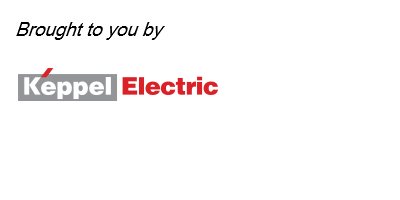Two young pupils stood in front of an exhibition board, eyes darting between cards showing different pictures – among them a bus, a dishwasher and fresh strawberries. After some consideration, they rearranged the cards from top to bottom, and were asked if that was their final answer.
They nodded hesitantly. The cards were flipped, showing the carbon footprint of using public transport, doing the dishes using a dishwasher, and freezing strawberries. Kee Sofie and Patel Kashvi Dhavalkumar groaned in unison at their wrong answers – they were supposed to rank each activity in order of its contribution to global warming, measured by carbon dioxide equivalent (CO2e).
The girls did not expect the strawberry-freezing process to result in such a high carbon emission. Nonetheless, it was a fun game. Sofie, a Primary 5 pupil, said, “I like everything about this exhibition, especially the interactive games that taught me more about my carbon footprint.”
Empowering students to do more for the Earth
These pupils were participating in an activity called “Game of CO2” which was part of an exhibition on climate change and sustainability launched in September this year. Funded by Keppel Electric and organised by TerraSG, a regional sustainability social enterprise headquartered in Singapore, “Powering a Brighter Future” is a programme that aims to educate primary and secondary school students on how different energy sources contribute to global warming.
Through the exhibition, the pupils learnt about renewable energy sources, energy-saving tips, and causes of climate change. Ms Tay Anling, a teacher at Xingnan Primary School, was impressed. “What I liked about this exhibition was how effective it was, because the students can learn information at their own pace and relate to their own actions at home and in school. They were engaged in how they can do their part to reduce their carbon footprint.”
The pupils are already familiar with green initiatives. Xingnan Primary School runs a fortnightly shoe recycling project and “trash for treasure” general recycling programme. However, the exhibition has encouraged pupils to reflect more deeply on their contribution to climate change. Kashvi, a Primary 4 pupil, said, “If we do not protect the environment, climate change will harm animals and people.”
Starting sustainability education early

Keppel Electric plans to bring climate education and outreach to about 20,000 students in eight schools in 2022, with further plans to expand this initiative over the next two years. Future programmes will include new topics and interactive programmes to engage students.
Ms Janice Bong, director of Keppel Electric said: “We are committed to contribute to Singapore’s sustainability efforts, and embarked on this outreach programme to encourage students and the next generation to play an active role in climate action.”
Beyond educational outreach, Keppel Electric is also working on other initiatives to support Singapore’s climate commitment of achieving net-zero emissions by 2050. As an electricity retailer on the Open Electricity Market, it rolled out its ecoGreen plan in early-2022, an affordable offering for households who wish to opt for carbon-neutral energy from renewable sources.
Under the ecoGreen plan, electricity is generated from renewable energy sources such as solar energy. Power generation is certified under the internationally recognised Renewable Energy Certificate scheme.
To support ecoGreen plan customers on their journey towards greener homes, Keppel Electric also offers customers residing in terrace, semi-detached or detached houses the option to install solar panels on their premises.
Residential customers who do so can even sell back excess solar energy to the grid under the Enhanced Central Intermediary Scheme managed by SP Group. This will be reflected as export rebates in their electricity bill, resulting in savings, in addition to the benefits to the environment.
In June this year, Keppel Electric became the first electricity importer licensee in Singapore. With this, Keppel Electric was able to import up to 100 megawatts of renewable hydropower via the Lao PDR-Thailand-Malaysia-Singapore Power Integration Project through a multilateral agreement, which allows the company to better provide renewable energy to customers.
Keppel Electric is also helping commercial customers reduce their environmental impact through Keppel Infrastructure’s ecosystem. “Keppel’s Vision 2030 puts sustainability at the core of our strategy. Together with our parent company Keppel Infrastructure, we are offering Energy-as-a-Service to help businesses implement energy-efficient solutions, such as the installation and operation of super-efficient chiller systems, photovoltaic solar panels and EV-charging infrastructure, in a scalable manner over the long-term, without needing to make upfront capital investments,” said Ms Bong.
Everyone, young or old, has a part to play
Back at Xingnan Primary School, the pupils discussed how they could reduce their personal carbon footprint. One student said he would walk or ride a bicycle to school. Another said she would use the fan instead of an air-conditioner. One ambitious student said she would hand-wash her clothes instead of using the washing machine.
Their well-meaning intentions were inspired by a newfound drive to protect the environment. Primary 4 pupil Goh En Rui Ray said: “We need to do our part. If we continue to release CO2, we won’t have clean air to breathe and a clean environment to live in.”
Learn more about how Keppel Electric is building a better tomorrow.


